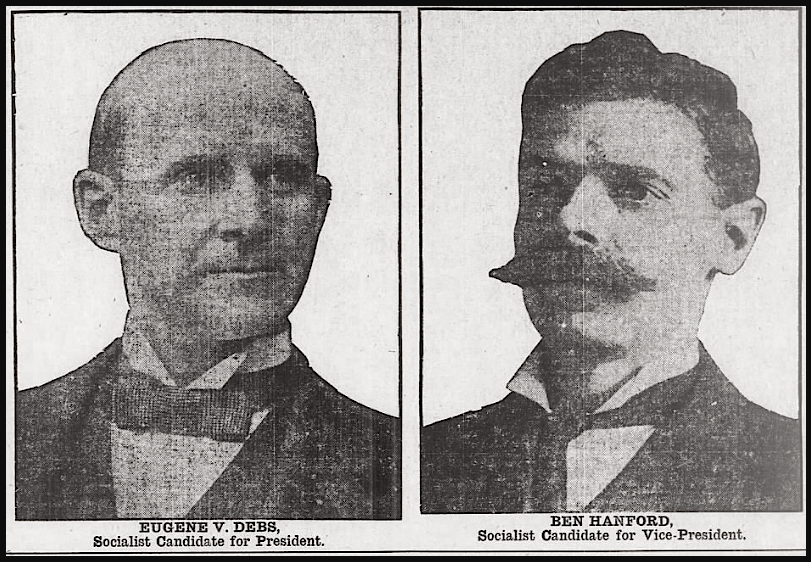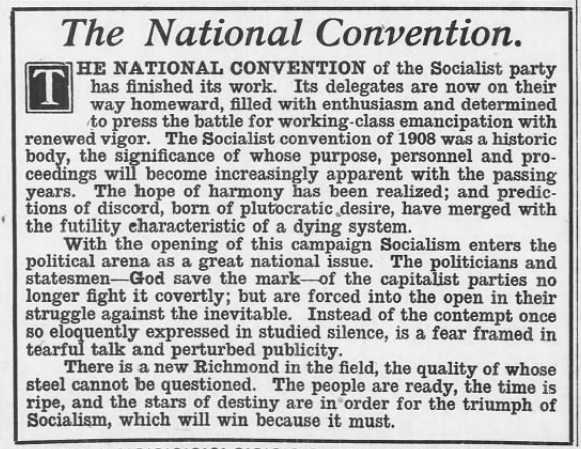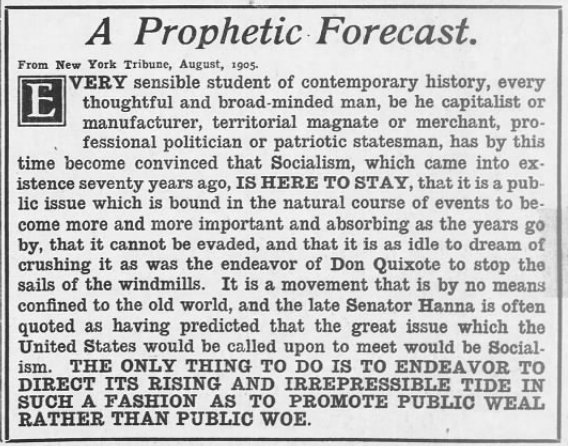
~~~~~~~~~~~~~~~~~~~~~~~~~~~~~~~~~~~~~~~~~~~~
Hellraisers Journal, Tuesday May 26, 1908
Girard, Kansas – Town Throws Surprise Party for ‘Gene Debs
From the Appeal to Reason of May 23, 1908:
All of Girard and half of the county assembled in the court house park last Saturday afternoon [May 16th]. A hastily improvised platform had been erected, and, to the music of bands and lusty cheering of the citizens of this little town, irrespective of party affiliation, ‘Gene Debs was escorted forward and introduced to the enthusiastic crowd by Mayor Ryan. The mayor was preceded by E. N. Richardson, who, in a few moments’ speech, voiced the sentiment of every man and woman and child in Girard when he said:
Ladies and Gentlemen-My Friends and My Comrades:-Here is a man whom you all know-many of you may not yet agree with him in his political beliefs; many of you will not vote for hem, but you all love him-you love him because you can’t help yourself; you love him because he is the most lovable man America has ever produced…
Comrade Debs had been kept in complete ignorance of the little surprise party. For a few moments he seemed overwhelmed at the expressions of good will and the smiling faces on every hand. But he quickly recovered from the slight embarrassment, and began to talk. And such a talk! As a father talks to his children, Debs talked to those gathered under the shade of the spreading elms in the court house yard. It wasn’t a wildly enthusiastic gathering, such as one would expect to see on an occasion like this. It was rather a gathering of men and women in dead earnest who realized the deep significance of the occasion and were determined to let no single word which fell from the speaker’s lips escape them. One could almost feel the spirit of the revolution-it impressed me as a counterpart of those meetings of colonial patriots just prior to the signing of the Declaration of Independence. “Momentous and significant.” These words sum up the Girard meeting at which the citizens of this village, without a dissenting voice expressed their congratulations to their fellow townsman, nominated for the presidency by the Socialist national convention.
At the close of the address a group of little children, bearing baskets of flowers and wreaths, and their little faces suffused with smiles, marched to the platform and literally smothered their friend with roses. Tears came to the big brother’s eyes as he gathered the little ones to him. An hour later, I passed ‘Gene sitting on the curb with a dozen bright haired lassies clinging to his arms and shoulders! Mark my words: “You can pin your faith to the man loved by children.”
———-
Socialist Party of America-1908
Socialist Declaration of Principles.
(The following preamble to the Socialist platform was adopted at Chicago last week. The platform proper has not been completed as this edition goes to press.)
Human life depends upon food clothing and shelter. Only with these assured are freedom, culture and higher human development possible. To produce food, clothing and shelter, land and machinery are needed. Land alone does not satisfy human needs. Human labor gets raw materials and food out of the soil by creating machinery and using it upon the land. Whoever has control of land and machinery has control of human labor, and with it human life and liberty.
Today the machinery and the land used for industrial purposes are owned by a rapidly decreasing minority. So long as machinery is simple and easily handled by one man, it does not make its owners so powerful that they can dominate the sources of life of others. But when machinery becomes more complex and expensive, and requires for its effective operation the organized effort of many workers, its influence reaches over wider and wider circles of life. The owners of such machinery become the dominant class.
In proportion as the number of such machine owners, compared to all other classes, decreases their power in the nation and in the world increases. They bring ever larger masses of working people under their control, reducing them to the point where muscle and brain are their only productive property. Millions of formerly self-employing workers thus become the helpless wage slaves of the industrial masters.
THE CLASS STRUGGLE
The more the economic power of the ruling class grows, the less useful does it become in the life of the nation. The overwhelming bulk of the useful work of the nation falls upon the shoulders of the classes that either have no other productive property but their manual and mental labor power—the wage workers—or of that have but little land and little effective machinery outside of their labor power—the small traders and small farmers. The ruling minority is steadily becoming useless and parasitic.
A bitter struggle over the division of labor is waged between the exploiting propertied classes on the one hand and the exploited propertyless class on the other. In this struggle the wage working class cannot expect adequate relief from any reform of the present order or from the dominant class of society.
The wage workers are, therefore, the most determined and irreconcilable antagonists of the ruling class. They are also the class which suffers most from the curse of class rule. The fact that a small number of capitalists is permitted to all the country’s resources and social tools for their individual profit, and to make the production of the necessaries of life the object of their competitive private enterprise and speculation, is at the bottom of all the social evils of our time.
INDUSTRIAL CRISES
In spite of the organization of trusts, pools and combinations, the capitalists are powerless to regulate production for social ends. Industries are largely conducted in a planless manner. Through periods of feverish activity the strength and health of the workers are mercilessly undermined, and during periods of enforced idleness the workers are frequently reduced to starvation.
The climaxes of this chaotic system of production are the regularly recurring industrial depressions and crises which paralyze the nation every fifteen or twenty years.
In its mad and reckless race for profits the capitalist class is bound to exploit the workers to the very limit of their endurance and to sacrifice their physical, moral and mental welfare to its own insatiable greed. Capitalism keeps the masses of workingmen in poverty, destitution, physical exhaustion and ignorance. It drags their wives from their homes to the mill and factory. It snatches their children from the playgrounds and schools and grinds their slender bodies and unformed minds into cold dollars. It wantonly disfigures, maims and kills hundreds of thousands of workingmen annually in mines, on railroads and in factories. It drives millions of workers into the ranks of the unemployed and forces large numbers of them into beggary, vagrancy and all forms of crime and vice.
INDUSTRIAL INSTITUTIONS.
To maintain their rule over their fellowmen, the capitalists must keep in their pay all organs of the public powers, public mind and public conscience. They control the dominant parties and, through them, the elected public officials. They select our executives, bribe the legislatures and corrupt the courts of justice. They own and censor the press. They sway our educational institutions. They own the nation politically and intellectually just as they own it industrially.
The struggle between wage workers and capitalists grows ever fiercer, and has now become the only vital issue before the American people. The wage-working class, therefore, has the most direct interest in abolishing the capitalist system. But in abolishing the present system the workingmen will free not only their own class, but also all other classes of modern society: The small farmer, who is today exploited by large capital more indirectly but not less effectively than is the wage laborer; the small manufacturer and trader, who is engaged in a desperate and losing struggle for economic independence in the face of the all-conquering power of concentrated capital; and even the capitalist himself, who is the slave of his wealth rather than its master. The struggle of the working class against the capitalist class, while it is a class struggle, is thus at the same time a struggle for the abolition of all classes and class privileges.
MISSION OF THE SOCIALIST PARTY.
The private ownership of the land and means of production used for exploitation is the rock upon which class rule is built; political government is its indispensable instrument. The wage-workers cannot be freed from exploitation without conquering the political power and substituting collective ownership for private ownership of the land and means of production used for exploitation.
The basis for such transformation is rapidly developing within the very bosom of present capitalist society. The factory system, with its immense machinery and minute division of labor, is rapidly destroying all vestiges of individual production in manufacture. Modern production is already very largely a collective and social process, while the great trusts and monopolies which have sprung up in recent years have had the effect of organizing the work and management of some of our main industries on a national scale, and fitting them for national use and operation.
In the struggle for freedom the interests the workers of all nations are identical. The struggle is not only national but international. It embraces the world and will be carried to ultimate victory by the united workers of the world.
To unite the workers of the nation and their allies and sympathizers of all other classes to this end, is the mission of the Socialist party. In this battle for freedom the Socialist party does not strive to substitute working class rule for capitalist class rule, but to free all humanity from class rule and to realize the international brotherhood of man.
—–
—–
———-
~~~~~~~~~~~~~~~~~~~~~~
SOURCE & IMAGES
Appeal to Reason
(Girard, Kansas)
-May 23, 1908
https://www.newspapers.com/image/67587309/
https://www.newspapers.com/image/67587314/
See also:
Hellraisers Journal, Monday May 25, 1908
Town Square, Girard, Kansas – Most Famous Citizen Celebrated
Town of Girard Honors Eugene Debs, Socialist Party Nominee for President of United States
Girard, Kansas
https://en.wikipedia.org/wiki/Girard,_Kansas
Tag: Debs Campaign 1908
https://weneverforget.org/tag/debs-campaign-1908/
SPA Platform of 1908
-from June 1908 issues of International Socialist Review:
https://play.google.com/books/reader?id=91dIAAAAYAAJ&printsec=frontcover&pg=GBS.PA758
~~~~~~~~~~~~~~~~~~~~~~~~~~~~~~~~~~~~~~~~~~~~
We Only Want the Earth (Be Moderate) -The James Connolly Songbook Band
Lyrics by James Connolly
https://www.marxists.org/archive/connolly/1907/xx/wewnerth.htm





